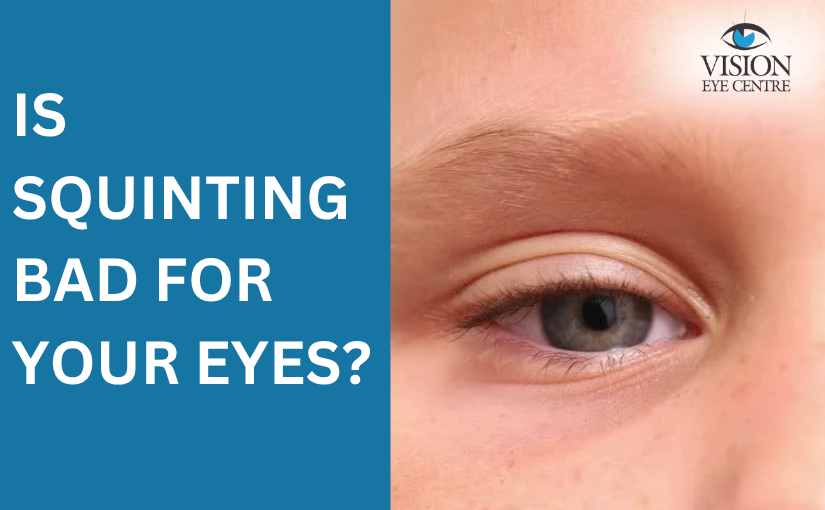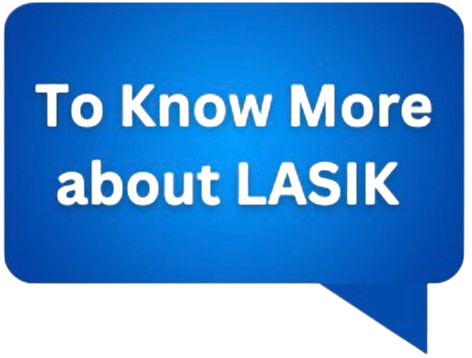
Is Squinting Bad for Your Eyes?
Nov 18, 2025
Many of us squint our eyes when trying to read something far away, look at a bright screen, or focus in the sun. While it might seem harmless, frequent squinting can sometimes signal an underlying vision problem. You might have wondered — is squinting bad for your eyes? or does it cause damage in the long run?
The short answer is that occasional squinting won’t harm your eyes, but constant squinting could mean you’re straining your eyes unnecessarily — and that can lead to discomfort, headaches, and visual fatigue. In some cases, it might even point to an eye condition that needs professional attention.
Let’s explore what squinting really does to your eyes, why it happens, and when it’s a sign you should see an eye specialist.
What does Squinting Mean?
Squinting simply means narrowing your eyelids slightly to improve your ability to focus. When you squint, you reduce the amount of light entering your eyes and increase the sharpness of the image by changing the shape of your eye opening.
It’s your body’s natural reflex to get a clearer image when your eyes can’t focus properly. For example, you might squint when:
-
Reading small print
-
Looking at objects in bright sunlight
-
Trying to see something far away without glasses
-
Focusing on a digital screen for too long
While this helps temporarily, frequent squinting could indicate that your eyes are overworking to compensate for a vision problem such as nearsightedness, farsightedness, or astigmatism.
Is Squinting Bad for Your Eyes?
Occasional squinting — like when you’re outside in the sun or trying to read something in dim light — is not bad for your eyes. It’s a short-term mechanism your body uses to sharpen focus.
However, frequent or constant squinting can be a problem. It may cause:
-
Eye strain: Continuous tightening of the eye muscles can make them tired.
-
Headaches: Overuse of facial and eye muscles leads to tension headaches.
-
Blurry vision: The temporary improvement from squinting can mask an underlying refractive error, delaying corrective treatment.
-
Fine lines around the eyes: Over time, habitual squinting contributes to the development of wrinkles, often called crow’s feet.
So, while squinting is not directly harmful, it’s a sign that something isn’t right with your vision. If you find yourself doing it often, it’s best to visit an Eye Hospital in Delhi like Vision Eye Centre for a thorough eye examination.
Why do People Squint?
There are several reasons why people squint, and understanding them can help determine whether it’s harmless or something that requires medical attention.
1. To Improve Focus
Squinting slightly reduces the light entering your eyes and changes the shape of your eye opening, helping you focus more clearly on objects.
2. To Reduce Glare
In bright environments, squinting helps block excess light and reduces glare, improving comfort and clarity.
3. Due to Refractive Errors
If you have conditions like myopia (nearsightedness), hyperopia (farsightedness), or astigmatism, your eyes may naturally squint to try to correct blurry vision.
4. Digital Eye Strain
Prolonged screen time can make your eyes tired and dry. As a result, you may start squinting to see clearly or to reduce discomfort.
5. Medical Conditions
Persistent or involuntary squinting could also indicate eye alignment issues such as strabismus (commonly called a squint or crossed eyes). In such cases, you might need Squint Eye Surgery in Delhi to correct the misalignment.
When is Squinting a Sign of a Problem?
You should consider seeing an eye doctor if:
-
You squint frequently to see objects at any distance
-
You have constant headaches or eye strain
-
Your vision seems blurry or unfocused
-
You experience eye pain or fatigue after screen use
-
You notice one eye drifting or misaligned
Persistent squinting may mean you need glasses, contact lenses, or medical treatment. A comprehensive eye exam can determine whether you have refractive errors, eye muscle imbalance, or other vision issues.
Can Squinting Cause Permanent Eye Damage?
No, squinting itself does not cause permanent eye damage, but it’s a warning sign. It indicates that your eyes are working harder than they should, which can lead to:
-
Eye fatigue and soreness
-
Increased sensitivity to light
-
Headaches and difficulty concentrating
In children, constant squinting could be a sign of undiagnosed vision problems. Untreated, it can lead to lazy eye (amblyopia) or strabismus, requiring surgical correction later in life.
How to Stop Squinting Frequently
Here are some practical ways to reduce the need for frequent squinting and keep your eyes healthy:
1. Get an Eye Check-Up
Schedule regular eye exams at a trusted Eye Hospital like Vision Eye Centre. An eye test will help detect refractive errors or early signs of eye diseases.
2. Use Corrective Lenses
If you have vision issues, wearing the right prescription glasses or contact lenses will eliminate the need to squint to see clearly.
3. Manage Screen Time
Follow the 20-20-20 rule — every 20 minutes, look at something 20 feet away for 20 seconds. This reduces digital eye strain.
4. Use Proper Lighting
Avoid reading or working in dim lighting. Adequate lighting reduces strain and minimizes the urge to squint.
5. Wear Sunglasses
Use UV-protective sunglasses outdoors to prevent glare and avoid squinting in bright sunlight.
6. Address Misalignment Issues
If squinting is caused by eye muscle imbalance, consult a specialist about Squint Eye Surgery in Delhi. Corrective surgery can realign the eyes and improve both vision and appearance.
What Happens in Squint Eye Surgery?
If your squinting is due to strabismus (eye misalignment), surgical intervention might be necessary.
At Vision Eye Centre, the procedure is performed by experienced ophthalmologists and involves the following steps:
-
Pre-Surgery Evaluation: Your doctor assesses the degree of misalignment and overall eye health.
-
Anesthesia: The surgery is performed under local or general anesthesia.
-
Muscle Adjustment: The surgeon adjusts or repositions the eye muscles to realign the eyes correctly.
-
Recovery: Most patients recover within a few days, with minimal discomfort.
The goal of the surgery is not only to improve cosmetic appearance but also to enhance binocular vision (the ability to use both eyes together effectively).
Conclusion
So, is squinting bad for your eyes? Not in small amounts — it’s your body’s natural way to improve focus temporarily. However, frequent squinting is a sign that your eyes may be struggling to see clearly and need professional evaluation.
At Vision Eye Centre, one of the leading Eye Hospitals, specialists provide expert diagnosis and advanced treatments like Squint Eye Surgery to correct vision problems and restore comfort.
Whether your squinting is due to refractive errors, glare sensitivity, or an alignment issue, early intervention ensures healthier eyes and clearer vision for years to come.
Frequently Asked Questions
1. Is squinting bad for your eyes?
Occasional squinting is harmless, but constant squinting can lead to eye strain and headaches. It’s often a sign of a vision issue that needs correction.
2. Does squinting damage your eyesight permanently?
No, it doesn’t cause permanent damage, but it indicates that your eyes are working harder than normal to focus.
3. Why do I squint when using my phone or computer?
You may be experiencing digital eye strain or have an uncorrected refractive error. Adjusting screen brightness and taking breaks can help.
4. Can squinting cause wrinkles around the eyes?
Yes, frequent squinting over the years can contribute to fine lines and wrinkles, commonly known as crow’s feet.
5. What should I do if I notice one eye turning inward or outward?
That may be a sign of strabismus. You should visit an eye specialist immediately for evaluation and possible Squint Eye Surgery in Delhi.
6. Can children develop squint eyes?
Yes, squints are common in children and should be treated early to prevent vision problems like lazy eye.

